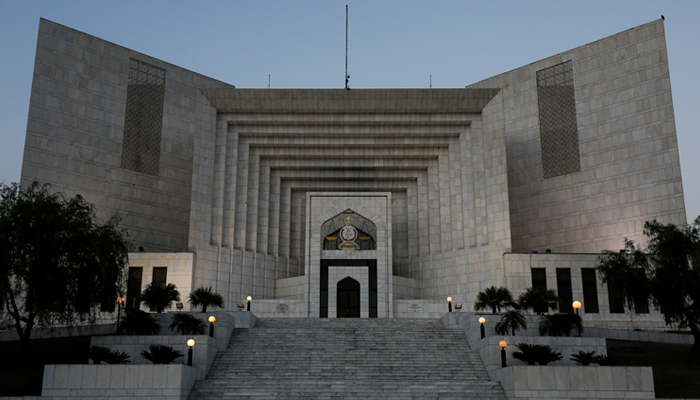All bound to abide by parliament's enacted laws: CJP Isa
Supreme Court reserves verdict on petition related to RTI seeking information about its staff
September 28, 2023

- Verdict reserved on petition related to information about SC staff.
- SC tells AGP Awan to submit replies to queries within two weeks.
- Under RTI, armed forces "could not be asked to share information".
ISLAMABAD: The Supreme Court (SC) Wednesday reserved its verdict on a petition related to Right To Information seeking information about its staff as well as recruitments made to fill the vacant positions in the apex court.
A three-member SC bench, headed by Chief Justice Qazi Faez Isa, and comprising Justice Aminuddin Khan and Justice Athar Minallah, reserved the verdict after hearing arguments of the Attorney General for Pakistan (AGP) and the petitioner.
The CJP remarked that all, including the apex court, were bound to abide by the laws made by the parliament, but the petitioner had raised very complex legal points in the current case.
He remarked that the court would also examine the practice being adopted in this regard by other countries in the world.
It directed the petitioner as well as AGP Mansoor Usman Awan to submit replies to the queries asked by the bench within two weeks. In 2019, one Mukhtar Ahmed Ali filed a petition in the apex court under the Right To Information (RTI) law to demand information about the staff of the apex court and the recruitments made to fill in the vacant positions there.
The registrar of the Supreme Court had filed a petition in the Islamabad High Court through Additional Attorney General Chaudhry Aamir Rehman against the Commission’s July 12, 2021 order, which directed the SC registrar to share with the appellant the requested information at the earliest, but not later than 20 working days of the receipt of the order.
The SC registrar had contended before the IHC that the Pakistan Information Commission (PIC) could not pass such an order regarding constitutional courts as its jurisdiction was confined only to those departments that are established under statute or law.
On Wednesday, the petitioner appeared before the court in person while Chief Justice Isa asked the petitioner why he was seeking this information.
The petitioner replied that he had sought the details under the RTI Act, adding that although he was not bound to give the reasons, he could explain why he sought such details.
The chief justice agreed to the petitioner’s answer but said he just wanted to know for his knowledge.
The petitioner submitted that he was working on the transparency of the country’s institutions, which is why he sought the details about the apex court.
Attorney General Awan submitted that the SC registrar had challenged the order of the PIC in IHC and a single bench had given its decision against which the petitioner had filed an appeal in the apex court.
CJP Isa raised a question that if the PIC asked for making public details of judges’ private families one day, then what would happen? Whether it would be ignored or could be challenged.
Justice Minallah, while adding to the question, asked whether the order of PIC would be challenged by the family members of the judges or the Supreme Court itself.
The petitioner submitted that the PIC order was challenged in the Islamabad High Court by the SC registrar through Additional Attorney General Chaudhry Aamir Rehman.
The attorney-general, to a court query, submitted that the SC registrar had hired the services of Chaudhry Aamir Rehman not in a government capacity.
The AGP, while replying to a court query, submitted that under Article 19-A of the Constitution, the SC had no immunity concerning the Access to Information Act 2017.
He submitted that the Supreme Court could make amendments to its rules in the public interest and appoint an officer who could provide information to the public on demand.
The attorney-general submitted that the court could regulate the process of providing information to the public but could not refuse the information.
At this, Justice Minallah asked the AG whether the independence of the judiciary would not be affected while seeking information about it.
Whether the armed forces of Pakistan are also bound to provide information under the Access to Information Act 2017, Justice Athar Minallah asked the AG.
The AG, however, replied that under this law, the armed forces could not be asked to share information.
At this, Justice Minallah remarked as to whether it is not against Article 19-A of the Constitution when access to information could not be applied there. Later, the court reserved the verdict on the matter.
Originally published in The News











